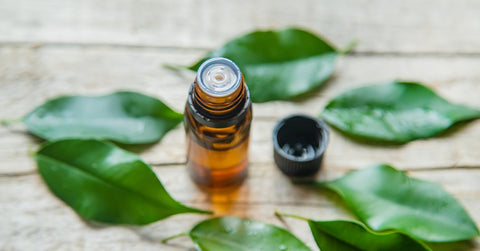Best Essential Oils for Acne

Whether this is as teenagers going through an awkward phase or later on as adults, acne can become a minor annoyance or a major issue depending on the severity. When an outbreak occurs, it can be frustrating and embarrassing. This has led many to wonder what to do about acne and how to properly handle it.
What Are The Causes Of Acne?
Generally speaking, acne begins when the skin flakes and sebum (which is basically skin oil) begins to clog your pores. When your pores are clogged up, they become a breeding ground for bacteria, particularly Propionibacterium acnes bacteria. This type of bacteria is what contributes to the cause of pimples.
The dirtier and oilier your skin is, the greater your chance of developing acne that you have. This is why it is so important to have a skincare regimen to ensure that your skin is as clean as it can possibly be. Sometimes cleaning your skin is just not enough. The dirt and bacteria manage to get under your skin and still manifest themselves in the form of acne. It can be frustrating to deal with, but it isn’t the end of the world.
Acne and Essential Oils
If you have been dealing with acne for a while now and are looking for an alternative to traditional prescription and drugstore acne treatments, one avenue to consider is essential oils. Using essential oils as part of the skincare regimen might be daunting, but in reality, essential oils are proven to have anti-inflammatory and antibacterial properties that can treat acne breakouts and make skin more healthy.
Essential oils are plant chemicals that are extracted from different parts of the plant using steam. This can include the flowers, seeds, leaves, roots, and even stems of these plants and can have a substantial impact as far as their healthcare treatment capabilities. Plant extracts also have a long history when it comes to traditional folk medicine. Not only that, but modern medicine is also beginning to implement essential oils into some treatments because of the benefits found in them.
One of those benefits includes killing bacteria, which is one of the primary causes of acne. While there are few studies out there to support the notion that essential oils can clean and treat acne, many people are beginning to see the benefits for themselves. And while there isn’t enough evidence to act as solid proof for guaranteeing results, essential oils are generally safe to try and you may see positive results at best or no results at worst, meaning it will not make your acne flare up even more.
Take note: if you are experiencing sensitivity or irritation when you begin using essential oils, you will want to stop treatment right away to prevent further irritation to your skin.
How Essential Oils Can Help With Acne
Essential oils can be a valuable addition to your skincare routine if you struggle with acne. They possess antimicrobial, anti-inflammatory, and antioxidant properties that can help combat acne-causing bacteria, reduce inflammation, and promote healing.
- Balancing Skin's Oil Production: Some essential oils mimic the skin's natural sebum, helping to balance oil production.
- Anti-inflammatory Properties: Acne is an inflammatory condition. Essential oils like tea tree and rosehip have properties that reduce inflammation, soothing the skin.
- Antibacterial Benefits: Acne-causing bacteria can be kept at bay with oils known for their antibacterial properties.
5 Best Essential Oils For Acne
| Essential Oil | Benefits for Acne | Potential Side Effects | Skin Type Suitability | Application |
|---|---|---|---|---|
| Tea Tree Oil | Antimicrobial | Skin irritation for some | Oily, acne-prone | Diluted in carrier oil, spot treatment, avoid sensitive skin |
| Lavender Oil | Calming | Possible irritation | All skin types | Diluted in carrier oil, avoid excessive use, patch test |
| Rosemary Oil | Antioxidant | Skin sensitization | Oily, acne-prone | Diluted in carrier oil, avoid during pregnancy, patch test |
| Frankincense Oil | Astringent | Rare skin reactions | All skin types | Diluted in carrier oil, mix with other oils, patch test |
| Clary Sage Oil | Hormone balancing | Skin irritation for some | Oily, combination | Diluted in carrier oil, avoid during pregnancy, patch test |
Please note that essential oils are potent and should be used with caution. Always perform a patch test before applying any essential oil to a larger area of the skin. Additionally, essential oils should be diluted in carrier oil before application to reduce the risk of skin irritation. If you have sensitive skin or any pre-existing skin conditions, it's a good idea to consult a dermatologist before using essential oils.
Here are a few essential oils that are more than worth trying thanks to their proven track record of being able to help treat acne.
1. Tea Tree Oil

Tea tree oil is one of the most popular essential oils for acne. It has powerful antimicrobial properties that can help kill acne-causing bacteria. Additionally, tea tree oil for acne helps reduce inflammation and redness associated with breakouts.
Pros:
- Effective against acne-causing bacteria
- Reduces inflammation and redness
- Natural alternative to harsh acne treatments
Cons:
- May cause skin irritation in some individuals
- Should be diluted before applying it to the skin
2. Lavender Oil

Lavender oil is known for its calming and soothing properties. It can help reduce stress, which is often linked to acne breakouts. Lavender oil also has antimicrobial properties that can help prevent acne-causing bacteria from proliferating.
Pros:
- Calming and soothing
- Reduces stress-related acne
- Has antimicrobial properties
Cons:
- May cause skin irritation in some individuals
- Should be used in moderation
3. Rosemary Oil

Rosemary oil has powerful antioxidant properties that can help protect the skin from free radicals and promote healing. It also has antimicrobial properties that can combat acne-causing bacteria.
Pros:
- Antioxidant properties
- Helps protect the skin
- Has antimicrobial properties
Cons:
- May cause skin irritation in some individuals
- Should be used in moderation
4. Frankincense Oil

Frankincense oil has been used for centuries for its healing properties. It can help reduce inflammation, promote cell regeneration, and improve the appearance of acne scars.
Pros:
- Reduces inflammation
- Promotes cell regeneration
- Improves the appearance of acne scars
Cons:
- May cause skin irritation in some individuals
- Should be used in moderation
5. Clary Sage Oil

Clary sage oil has antibacterial properties that can help fight acne-causing bacteria. It also helps regulate sebum production, making it beneficial for oily and acne-prone skin.
Pros:
- Antibacterial properties
- Regulates sebum production
- Beneficial for oily and acne-prone skin
Cons:
- May cause skin irritation in some individuals
- Should be used in moderation
How To Use Essential Oils For Acne
Before using essential oils on your skin, it's important to dilute them with a carrier oil, such as jojoba oil or coconut oil. This helps prevent skin irritation. You can apply the diluted essential oil mixture directly to the affected areas using a cotton pad or your fingertips. It's recommended to do a patch test before applying essential oils to your face to check for any adverse reactions.
Oils to Avoid for Acne-Prone Skin
- Olive Oil: While nutritious for the body, it can be comedogenic for the skin.
- Coconut Oil: Popular in skincare, but can clog pores for some individuals.
- Avocado Oil: Rich and heavy, might not suit acne-prone skin.
- Corn Oil: Can be too heavy and clog pores.
- Almond Oil: While moisturizing, it might not be suitable for all acne-prone individuals.
- Cotton Seed Oil: Can be comedogenic and not recommended for acne-prone skin.
Remember, while essential oils can offer numerous benefits, it's crucial to consult with a dermatologist or skincare expert before making significant changes to your skincare routine.
Oils to Approach with Caution
Not all oils are created equal. Some might exacerbate acne or clog pores. Here are a few to be wary of:
- Olive Oil: While nutritious for the body, it can be comedogenic for the skin.
- Coconut Oil: Popular in skincare, but can clog pores for some individuals.
- Avocado Oil: Rich and heavy, it might not suit acne-prone skin.
Incorporating Oils into Your Skincare Routine
Introducing oils into your skincare routine can be a game-changer. Here's a step-by-step guide:
- Patch Test: Always test a new oil on a small skin area to check for reactions.
- Cleanse: Ensure your skin is clean. Oils can penetrate better on cleansed skin.
- Apply: Use your fingertips to gently massage the oil into your skin.
- Moisturize: If needed, follow up with a moisturizer to lock in the benefits.
Final Thoughts
Incorporating essential oils into your skincare routine can be a natural and effective way to combat acne. Tea tree oil, lavender oil, clary sage oil, and frankincense oil are some of the best essential oils for acne due to their antimicrobial, anti-inflammatory, and healing properties. Remember to always dilute essential oils and perform a patch test before using them on your skin.
Whether this is as teenagers going through an awkward phase or later on as adults, acne can become a minor annoyance or a major issue depending on the severity. When an outbreak occurs, it can be frustrating and embarrassing. This has led many to wonder what to do about acne and how to properly handle it.

